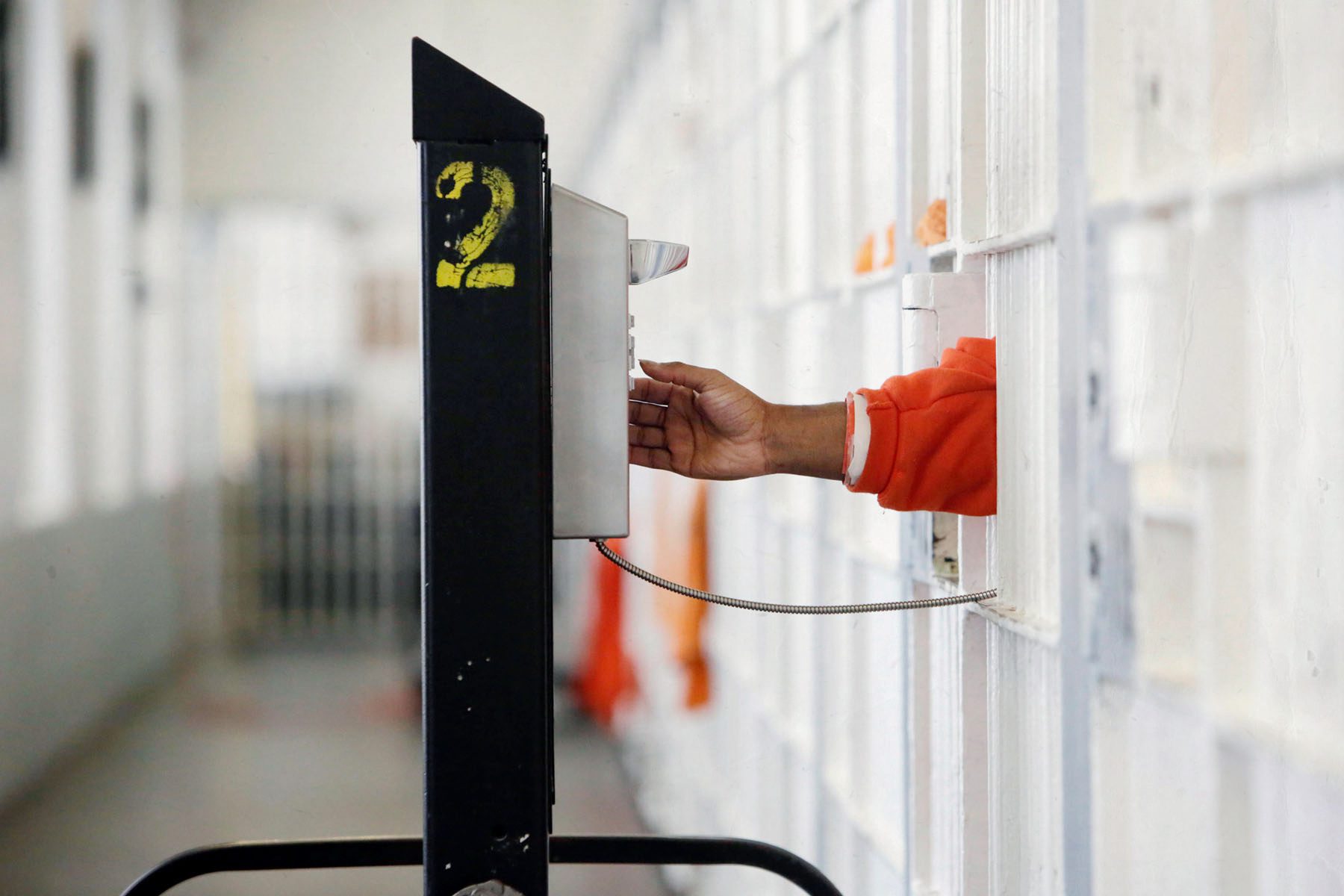We’re telling the untold stories of women and LGBTQ+ people. Subscribe to our daily newsletter.
Ulandis Forte had to adjust to a lot of changes during his 18 years of incarceration. From the time he was 20 years old, he moved from facility to facility, in states as far apart as Virginia, Ohio, Arizona and Pennsylvania. One constant in his life, however, were Sunday phone calls with his grandmother Martha Wright-Reed.
“I grew up in prison with my grandmother,” Forte, 49, told The 19th. “We talked at least once a week, every Sunday after church, when she got home. She kept me focused. I didn’t have to deal with the situation that I saw around me that other people were going through, because she always kept me focused.”
But paying for weekly phone calls wasn’t easy for Forte’s grandmother. At that time, an out-of-state phone call from a prison could amount to $17 dollars for 15 minutes. Wright-Reed’s determination to support her grandson grew into a dedication to fight for legal reforms that will support incarcerated people more broadly.
Wright-Reed spent years pushing for more sweeping action from the Federal Communications Commission (FCC) on phone costs, but died in 2015, before she could see a key piece of legislation named in her honor. This month, President Joe Biden signed the Martha Wright-Reed Just and Reasonable Communications Act, which clarifies the FCC’s authority to regulate the cost of all prison and jail phone calls throughout the country. Over the last 10 years, the FCC lowered the cost of some prison phone calls, but faced questions about the limits of its power.
The latest version of the bill was introduced by Democratic Sen. Tammy Duckworth of Illinois and passed the Senate and House last month. According to the law, any regulations will take place no earlier than 18 months and no later than 24 months from when it went into effect, which means sometime between July 2024 and January 2025.
-
Read Next:
“The people who run these incarceration facilities can make a deal with just a handful of companies that provide telephone services, and they charge exorbitant rates,” Duckworth told The 19th. “It becomes an unbearable burden on so many families who try to stay in touch with their loved ones. We know that recidivism rates drop if people can stay in touch with their families while they’re incarcerated, and this just makes it that much harder.”
One in 4 women have a family member who is incarcerated. More often than not, that person is a man — men make up more than 90 percent of the incarcerated population. Many times, women take on the responsibility of financially supporting incarcerated people by keeping money on their accounts for phone calls or commissary items.
Last year, The 19th spoke with Mary Estrada, a woman in Los Angeles County who said that at one point she spent around $2,000 a month supporting her incarcerated husband. These expenses included phone calls to her husband every day and weekly visits to his prison nearly two hours away. In Wright-Reed’s case, making weekly phone calls to her grandson forced her to make tough decisions like forgoing her medication payments at times or cutting back on groceries. Forte learned the full extent of this financial strain from his grandmother later on.
Such financial constraints for families became more commonplace following the 1990s, as the country’s incarceration rates soared and as privatized companies began to dominate the market for prison communications.
For years, companies have been able to charge incarcerated people much higher prices than the general public. Companies would charge between $1 and $4 to first connect the call, and then an additional 50 cents per minute on average. But the quality of the calls was often poor, leading to signals being lost, Forte said. If a call dropped at any point, people would need to pay an additional $1 to $4 to reconnect to their loved one.
-
More like this
- Illinois will be the first state to eliminate cash bail. Here’s why women led the push for reform.
- Mental health of incarcerated LGBTQ+ youth is understudied — but new analysis shows kids are in crisis
- Success of ‘slavery on the ballot’ measures could help incarcerated pregnant people of color
“You may be on a 15-minute phone call that drops after three or four minutes, and you still have to pay the full price for that time. It was just a double-edge sword, and people can’t afford that stuff,” Forte said. The barriers to staying in contact with incarcerated people can be so burdensome that the longer a person is locked up, the more likely communication from the outside world is to fizzle out into silence.
Forte said he saw the toll this isolation had on other incarcerated people, and he was grateful for his grandmother’s determination. Wright-Reed and other advocates worked alongside organizations like Color of Change to push the government to lower the cost of prison and jail communication.
At the heart of this issue was a debate over the FCC’s authority to regulate prison and jail calls. Without a law on the books specifically designating the agency’s power in this space, regulation was subject to interpretation by political appointees running the FCC and by the federal court system. For example, under Mignon Clyburn, who served as FCC commissioner during President Barack Obama’s administration, the agency in 2013 capped prison and jail calls made between out of state at 21 cents per minute.
After the agency tried a similar policy in 2015 to lower the cost of in-state calls — the majority of calls made by incarcerated people — a federal judge struck down the regulation and argued that the FCC does not hold such power over prison communication that did not cross state lines. In 2021, the agency once again moved to further lower out-of-state calls and address loopholes that enabled companies to skirt regulations. And now, the new Martha Wright-Reed Act will make the agency’s ability to cap both in-state and out-of-state prices easier by explicitly requiring the FCC to ensure “reasonable charges.” It also gives the FCC control over rates for video communication.
“In order for you not to be subject to the whims of who’s in power, legislation is the final authority on that,” said Sakira Cook, vice president of campaigns, policy and government affairs at Color of Change. “We thought that was the best route to ensure that the changes that we wanted to see, and the authority that we believe the FCC already had was cemented in writing and the law.”
Lower phone costs will not only go to support incarcerated men and the women who support them, but also a growing population of incarcerated women and LGBTQ+ people. Women are the fastest-growing incarcerated population in the country. LGBTQ+ people are incarcerated at disproportionately high rates and face a range of challenges inside jails and prisons, said Jasmine Tasaki, director of advocacy for Black & Pink, a national organization that advocates for incarcerated LGBTQ+ people.
“LGBTQIA people have experiences during incarceration that range from harassment, to medical mistreatment, being misgendered, and sometimes, rape,” Tasaki said. “Being connected to those people who are on the outside, who can not only advocate for you, but also provide you some mental support through the journey of being inside, is really important.”
Research indicates that regular contact with friends and family while incarcerated leads to more positive outcomes readjusting outside. One 2014 study found that incarcerated women who had phone contact with family members were less likely to be reincarcerated within five years of their release. Another paper from 2020 found improved parent-child relationships with regular phone calls.
Beyond the federal law, Connecticut and California have taken the initiative and gone further to make phone calls from correctional centers free. Forte said he is proud to see the work of his grandmother and other advocates gaining momentum.
“What’s surprising is that she wasn’t able to be here to be a witness to all of this,” he said. “It’s just amazing how far it has come because of the steps that she took at the very beginning. I never thought it would snowball into something so huge. I didn’t know it would turn into a movement so large.”








